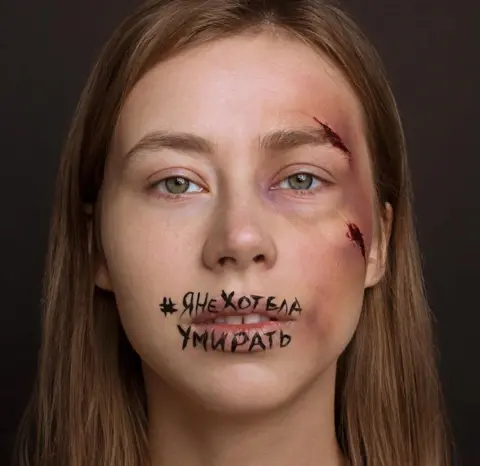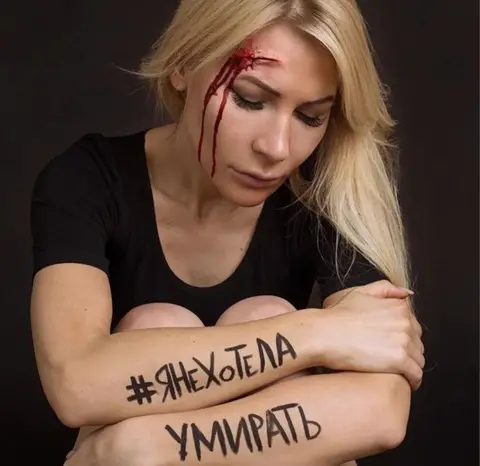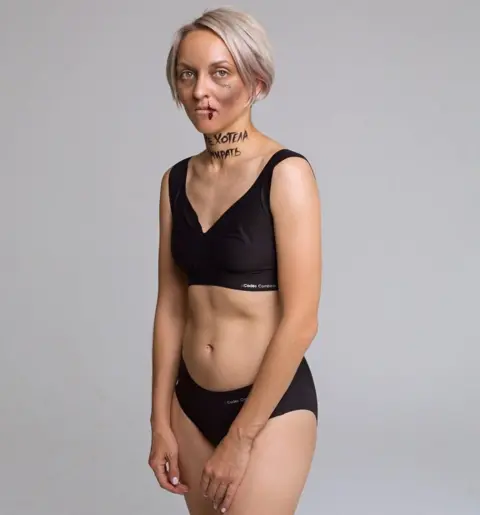'I didn't want to die': Why are Russians using bloody make-up to tackle domestic abuse?
 Alexandra Mitroshina
Alexandra Mitroshina
Thousands of Russians have taken to social media to call on the government to table and pass a domestic violence bill as soon as possible.
Human rights activists Alena Popova and Alexandra Mitroshina launched the campaign urging social media users to post images of themselves with the hashtag #янехотелаумирать (I didn't want to die) and to sign a petition.
Many of the participants using the hashtag have followed the pair by sharing images of themselves wearing make-up depicting blood, cuts and violence.
There has a been a surge in more widespread discussions around attitudes towards abuse and domestic violence in Russia.
Alexandra Mitroshina came up with the idea for the campaign and organised the initial photo shoots. Her image on Instagram has had more than 420,000 "likes" and is among the most widely shared.
 Alena Popova
Alena Popova
Her own posting highlights the story of Olga Sadykova, reportedly killed by her husband on 8 July in the village of Kumysnoye. The stabbing happened in front of her eight-year-old son, according to her family.
Ms Sadykova had previously reported her husband to the police, the Ministry of Internal Affairs of the Russian Federation said.
And, in June, officers had begun investigating him on suspicion of grievous bodily harm and making death threats.
"Oksana would have been alive if we had had a domestic violence law," Ms Mitroshina said.
"Russia needs a federal bill on preventing domestic violence and helping those who suffered from it.
"There is a chance that it will be considered this autumn.
"For this to definitely happen, we need a maximum public outcry."
Existing system 'not enough'
Her post was shared by lawmaker Oxana Pushkina, who is now working on a draft law against domestic violence.
She told English-language broadcaster RT: "The law on prevention of domestic violence is needed to make the number of such crimes as low as possible.
"The existing system of measures and law is not enough to protect the victim from the troublemaker."
 kkkrem/Instagram
kkkrem/Instagram
Blogger Oksana Kravtsova told her followers: "Every third women in Russia is beaten by her husband or partner. Every 45 minutes a woman is killed - at home - frightening numbers.
"Someone will criticise, 'Bloggers painted bruises and are hyping up.' But this hype is really necessary.
"[This is] because the public opinion should be changed in the first place.
"Organisers of the campaign fight for the adoption of the domestic violence law but as long as society thinks that abuse is acceptable, no law will work.
"I hope very much that after these images of 'beaten bloggers' at least someone will have a thought remaining in their head that physical, moral or sexual violence in the family is not a norm, that a family consists of safety and love".
'Powerful movement'
Last month, the hashtag #NotHerFault (#саманевиновата in Russian) gained a lot of prominence on Russian social media as women used it to draw attention to what they saw as the country's poor record on tackling violence and sexual assault against women.
This time around, Ms Popova said she had initially doubted whether Instagram would be an appropriate forum to create a "powerful movement" with the power to protect the rights of victims of violence.
Bloggers taking part in the campaign had received lots of negativity but it hadn't put any of them off, she said.
And the campaign was changing the language around discussions of the draft law, with lawmakers now talking about "its high importance".
"When women stand together shoulder to shoulder, it is such a great power," she said.
